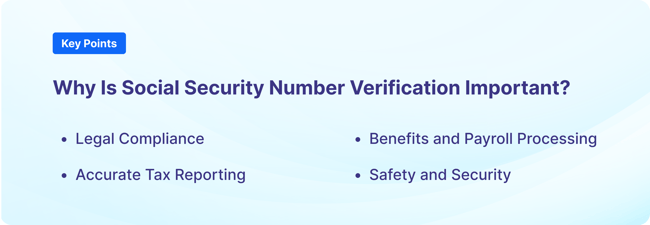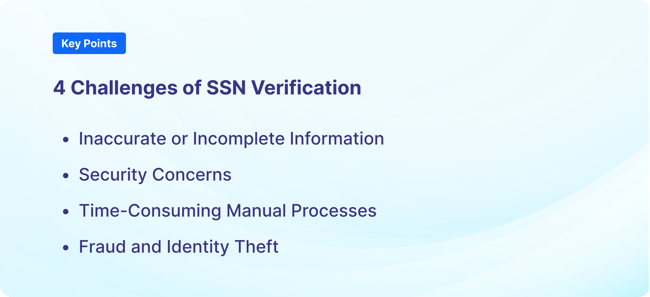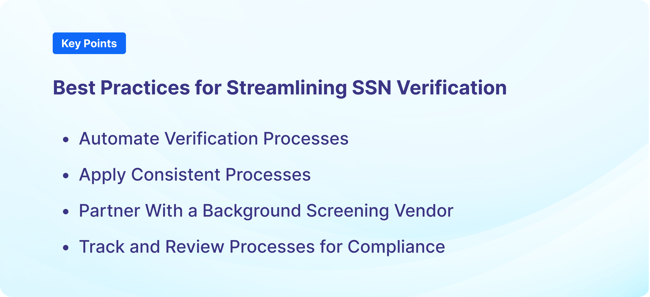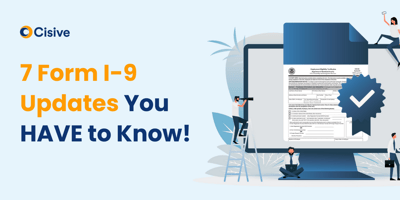%20Verification%20-%20BLOG.png)
.png?height=200&name=BLOG_%20SME%20-%20David%20Hair%20-%20New%20Form%20I-9%20NO%20CTA%20(1).png)
Are You Ready for DHS’ Alternative Procedure for Reviewing Employees’ Acceptable Documents for Form...
%20Verification%20-%20BLOG.png)
Social Security number (SSN) verification is a critical process for employers looking to maintain accurate records and protect the organization. SSN verification helps prevent identity theft, fraud, and other breaches. But it can also be time-consuming and error-prone, especially for larger organizations.
Explore the importance of SSN verifications, the associated challenges, and best practices for streamlining the process.
Key Takeaways
|

Social Security Numbers (SSNs) are unique identifiers assigned to U.S. citizens, permanent residents, and temporary (working) residents. In the employment context, SSNs are important for functions including tax reporting, benefits administration, and employment verification. Here are some of the use cases for SSN verification.
Employers are legally required by the federal Immigration Reform and Control Act to verify a worker’s SSN, immigration status, and eligibility to work in the United States). Noncompliance can result in fines, penalties, and sanctions against the employer.
SSNs are integral to the tax-reporting process, as they’re used to report worker earnings to the Internal Revenue Service and state tax agencies. Employers need accurate SSN information to generate annual wage reports and produce form W-2 wage and tax statements.
SSNs help employers maintain accurate payroll records, including retirement contributions and health insurance enrollments. This accuracy is vital for preventing fraud and ensuring that benefits are correctly allocated and distributed.
Verifying a worker’s SSN helps prevent identity theft and fraud. This verification is particularly important in sensitive industries and can protect the employer and workers from the legal repercussions of identity theft.
In some cases, a job applicant’s SSN is needed to run background check reports, such as a credit check for financial services job roles.
Pre-employment SSN verification ensures that any provided SSN is valid and accurate to the person. This process is crucial for compliance requirements, accurate tax reporting, and preventing fraud. Here's a brief overview:

Pre-employment Social Security Number (SSN) verification is a crucial and sometimes challenging step in the hiring process. Here are some of the hurdles employers may face.
The pre-employment SSN verification process can flag incomplete or inaccurate information that can lead to delays in verification and hiring. Time and resources are required to resolve the problems or disqualify the candidate.
Inaccuracies can also result in noncompliance, exposing the organization to potential fines and legal ramifications. Making sure information is accurate and complete up front makes for a smoother and more compliant hiring procedure.
SSNs are one form of personally identifiable information (PII) that employers must be sure to safeguard during pre-employment verification and afterward. This creates security challenges, as such information must be protected against unauthorized access, inadvertent disclosure, or deliberate attacks.
When PII is compromised, people’s privacy and security are jeopardized, and the organization is subject to liability and reputational damage. Employers need robust security measures and protocols to safeguard SSN data, including encryption, access controls, and regular security audits.
Pre-employment SSN verification can be conducted manually or be partially or fully automated with technology. Fully manual verification can be slower, less efficient, and labor-intensive — with a greater risk of human error that can compound delays and inaccuracies in verifying people’s employment eligibility. Such inefficiencies extend the time to hire and divert resources from other HR functions.
Automating these processes where possible can improve accuracy, reduce turnaround, and improve efficiency. Another benefit is that every worker is treated the same during the SSN verification process.
Employers must be vigilant against fraud and identity theft during SSN verification. Bad actors may provide fake or stolen SSNs to gain employment or access sensitive information.
However, employers aren’t allowed to take adverse action against someone simply because a SSN can’t be verified. Employers must be sure to identify typos or other minor errors, as well as check for additional names. If the employee still fails SSN verification, you must document your efforts to obtain accurate information.

The pre-employment SSN verification process benefits from following best practices for accuracy, compliance, and efficiency. Here, learn about the fundamental strategies employers use to streamline this essential aspect of the hiring process.
With the help of technology, employers can quickly cross-check SSNs against official records, which decreases the risk of human mistakes and speeds up the hiring process. As a result, HR personnel get time back for other important responsibilities. Automating the verification process improves organizational consistency, standardizes processes, contributes to compliance, and can reduce legal risks associated with manual methods.
Maintain accuracy and fairness in the hiring process by using consistent processes for verifying SSNs. Inconsistencies may occur if departments take different paths to verifying SSNs, such as mixing manual and automated methods.
Inconsistencies can cause otherwise similar candidates to be vetted differently than others. Manual checks might miss mistakes that automated systems would find, for example. Using the same method for everyone prevents potential bias and discrimination from slipping into the candidate verification process.
A background screening partner can streamline the SSN verification process by leveraging their expertise and access to comprehensive databases for quick and accurate results. Such vendors specialize in identity verification and can significantly reduce your internal team’s workload.
A trusted outside partner speeds up the hiring process with prompt verification and helps you meet security and compliance standards, making the process more efficient and reliable.
Cisive’s Social Security check, for example, is an investigative resource that builds a more complete candidate background.
Regularly assess your process for pre-employment SSN verification to make sure you’re in compliance with the latest laws and regulations. Failure to keep up with the latest rules can expose you to legal consequences if a preventable mistake is made.
These audits also ensure your process is accurate, effective, and efficient. Taking a proactive approach shows that you take your responsibility to hire fairly and legally seriously.
SSN verifications protect your business from legal risks and potential fraud, including preventing candidates from misrepresenting themselves and their employment eligibility. Having a trustworthy partner for background checks, like Cisive, can make the verification process more efficient, guaranteeing promptness, precision, and adherence to legal standards.
A partner like Cisive brings the required skills, technology, and awareness of regulatory updates to make verification easy and stress-free for employers and streamline the hiring process. An investment in a strong background checks partnership is an investment in your organization's future.
Want more answers to your employment verification questions? Schedule a call with one of our background screening experts.
.png?height=200&name=BLOG_%20SME%20-%20David%20Hair%20-%20New%20Form%20I-9%20NO%20CTA%20(1).png)
Are You Ready for DHS’ Alternative Procedure for Reviewing Employees’ Acceptable Documents for Form...

All U.S. employers must complete and retain a copy of the federal Form I-9, the Employment...

U.S. employers use Form I-9 for employment eligibility verification when hiring. That’s why you...